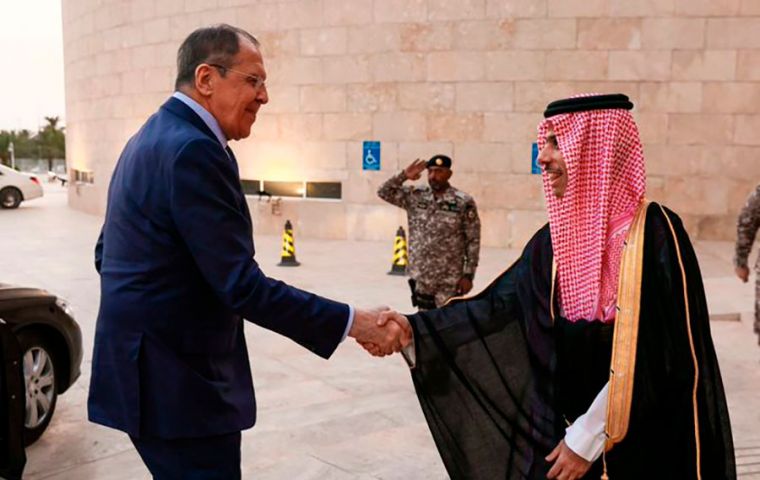MercoPress. South Atlantic News Agency
“Russia and Saudi Arabia closer than ever”, ahead of OPEC+ meeting
 Russian Foreign Ministry Sergei Lavrov met with his Saudi counterpart Prince Faisal bin Farhan Al Saud, and ahead of this week´s OPEC+
Russian Foreign Ministry Sergei Lavrov met with his Saudi counterpart Prince Faisal bin Farhan Al Saud, and ahead of this week´s OPEC+ The OPEC+ alliance is solid and the tight cooperation between Russia and Saudi Arabia has never been stronger, said Russian Foreign Ministry Sergey Lavrov, following a meeting with his Saudi counterpart Prince Faisal bin Farhan Al Saud, and ahead of this week´s OPEC+ meeting to consider output levels.
The news comes on the heels of a Wall Street Journal report that said some OPEC members are considering excluding Russia from the extended cartel as Western sanctions weigh on its production.
According to the report, excluding Russia from the oil production increase deal would allow other producers such as Saudi Arabia and the United Arab Emirates to boost their output more significantly, in line with requests made by the U.S. and Europe, as well as the International Energy Agency most recently.
However Saudi Arabia and the UAE themselves have repeatedly signaled that they had no plans to boost crude oil production beyond their production quotas under the OPEC+ agreement. How a change in Russia's participation in the deal could change that sentiment remains to be seen. Saudi Arabia and the UAE are the OPEC+ members with the most substantial spare production capacity.
OPEC+ is meeting this week to discuss the production deal, and while analysts had so far expected zero surprises from the cartel, the WSJ report, which cites unnamed OPEC delegates, might pique the interest of OPEC observers, comments Irina Slave from Oilprice.com
OPEC+ was created in 2016 to address the oil market downturn at the time. Initially, it was about reducing production to boot prices. When the pandemic hit, these cuts were deepened to unprecedented levels of close to 8 million bpd. Then the current agreement was closed last year to gradually return to pre-pandemic levels of output in tune with demand recovery.




Top Comments
Disclaimer & comment rulesCommenting for this story is now closed.
If you have a Facebook account, become a fan and comment on our Facebook Page!